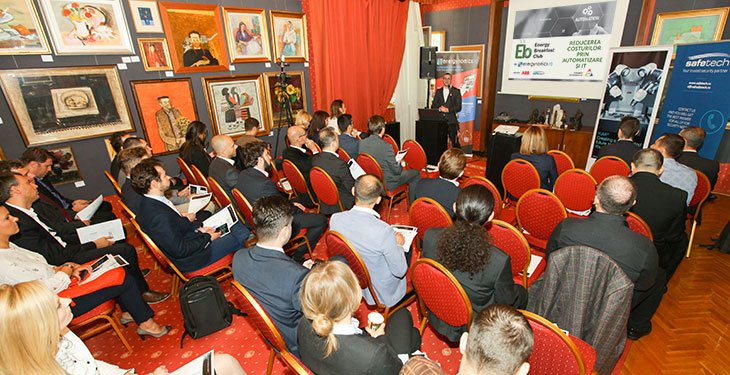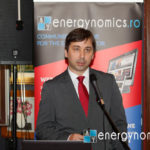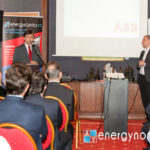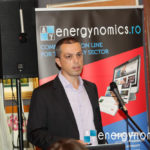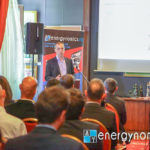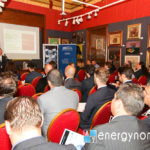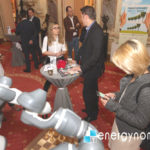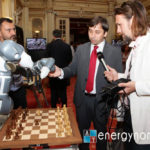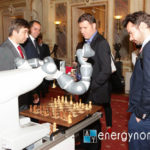Industrial robotics has come down a long time ago from SF films and is already occupying an important place in the production processes of Romanian companies; most of them belong to a dynamic and very large sector: automotive. However, there is a huge potential to cover yet, because automation solutions can meet the needs of any type of enterprise, however large or small. At the same time, the robots are connected and they are controlled by increasingly sophisticated information technology systems, for the protection of which tailored solutions to each usage environment are required. Even more important is the simultaneous understanding of both the advantages and the risks of adopting the new technologies.
Experts from ABB Romania and Safetech Innovations researched both sides of the coin at the latest Energy Breakfast Club edition, held on Wednesday, May 24th, at the Cesianu Racovita Palace in Bucharest.
Automation for increased industrial productivity
With 135.000 employees in 100 countries, as a global leader in energy and automation, ABB offers solutions to increase industrial productivity through four divisions:
- Energy networks
- Electrical and energy products
- Operation and automation
- Process automation
Daniel Sirman, Country Service Manager and Sales Manager Industry Segment at ABB Romania, reminded that since 2007 ABB Romania has been the only robot manufacturer in the country and sold 2 or 3 units in that year. “In 2016, we sold over 130 robots in Romania, because most of the large companies and, to our surprise, small companies also have found that such an investment is needed in the production processes”, said Daniel Sirman. ABB Romania’s industrial robots are mainly used in the automotive industry, but also in general industries: smelters, metallurgy, plastics, food and beverages, electronics and more.
Work is well suited for the robots…
The ABB Romania representative also referred to “the only truly collaborative robot in the world – YuMi. It works side by side with people and it is equipped with two flexible hands with joints allowing it to assemble small parts. “You saw it playing chess. We can reprogram it, and tomorrow it will play checkers or be able to assemble sockets in a factory”, explained Sirman, who exposed 10 reasons to invest in automation and robots.

[fruitful_ibox_row]
[fruitful_ibox column=”ffs-two-one”]
- Reduction of operating costs
- Improving product quality and consistency
- Improving the quality of work for employees
- Increased productivity rates
- Increasing production flexibility
- Compliance with safety and health norms and improving health and safety at work
[/fruitful_ibox]
[fruitful_ibox column=”ffs-two-one” last=”true”]
- Reducing the amount of material waste and increase efficiency
- Reducing staff fluctuations and the difficulty of recruiting workers
- Reduction of capital costs (inventory, ongoing works)
- Saving space in high value production areas
[/fruitful_ibox][/fruitful_ibox_row]
DOWNLOAD THE PRESENTATION OF DANIEL SIRMAN
“At present, the share robotic automation in Romania is 7 to 10%, and we have more than a thousand robots installed. In the entire market, other producers included, there are 3,000 – 4,000 robots in operation”, said Daniel Sirman. The ABB representative added that investments in industrial automation is recovered in two, up to five years, and the lifetime of a robot can reach 15-20 years with minimal maintenance costs, depending on the exploitation.
Security risks for SCADA systems
Mihai Răuţă, Senior Information Security Consultant at Safetech Innovations talked mainly about the security issues that the SCADA (Supervisory Control and Data Acquisition) systems are facing. They are as vulnerable as any other IT system, but they have a very wide impact when a cyber attack succeeds: interruption of electricity distribution, water pollution or floods, blocking the transport systems or large-scale disasters at production lines.
Spear phishing is the main vector of attack, said Mihai Răuţă; this method consists of doing an automatic research on the online behavior, mainly on social media, of the person that will be attacked, so that the attacker be able to tempt the person to click on a link or into opening a malicious file attached to an e-mail. “The methods are so advanced, that machine-learning algorithms are now being used; many of us use social networks and post personal data, data about our behavior.” A smart algorithm can analyse a huge volume of data, it can find correlations in the human behavior area, and it can produce a message, an e-mail that increases the probability that a particular person will be clicking on a link or opening a malicious document sent by the attacker”, explained the Safetech expert. This was the method used in the attack that affected the electricity distribution network in northern Ukraine in December 2015. “It is important to note that the attackers entered the IT network of the Ukrainean company one year before the actual attack”, added Mihai Răuţă, who pointed out that “a cyber-security system installed in the network would have identified the security incident one year before the actual attack”.
DOWNLOAD THE PRESENTATION OF MIHAI RĂUŢĂ
In their early days, the monitoring and control equipments used in the ICS systems were exchanging information in analogous or serial manner, they did not communicate with the internet and they were safe because the access to them was (could have been) severely restricted. “When the specific SCADA protocols (ModBus, DNP3 type) were tuned to IP protocols, these devices became accessible via the internet and thus became very vulnerable”, warned Mihai Răuţă.
Moving on to the security solutions, the Safetech representative mentioned two methods: securing all access points and creating more layers of security (defense in-depth), suitable for the corporate area, respectively specialized equipment and technologies for better reaction to the needs in the production area. “There are protection solutions that monitor the traffic in the SCADA systems, and that alert the of administrators the industrial networks, when security or operational incidents occur, so that any deviation from normal functioning of the production infrastructure is identified in time”, explained Mihai Răuţă, who said that discussions with critical energy infrastructure operators are already taking place in order to raise awareness of the risks: “we can implement security solutions to demonstrate how such vulnerabilities of the industrial systems can be mitigated, and the decision is now at company level”..
Over 40 representatives from #better, ABB România, ANRE Moldova, ARO, Ascentor, EFdeN, EnergoBit, Exe Green Holding, Expert Business, FEL România, Huawei, MET, Money Corp, Navridis, Roland Berger, Romelectro, RRA, RVR Energy, Safetech Innovations, SII, Simtel Team, SMC Romania, Socomec Romania, Suite Home, Telekom, TPMR Simulation, UTI, Zurich Broker attended the presentations and participated in discussions.
The event was organized by energynomics.ro and supported by our partners: ABB România, Safetech.
Participation
This year, energynomics.ro aims to organize at least 10 Energy Breakfast Club meetings. The schedule and the proposed themes for 2017 are available in the Energy Breakfast Club dedicated page.
